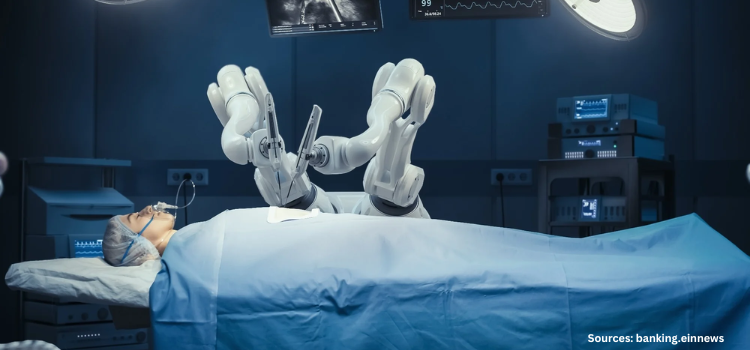Revolutionizing Healthcare: Advancements and Trends in Medical Robotics
17-Feb-2025

Introduction
In the ever-evolving landscape of healthcare, medical robotics stands at the forefront of technological progress. Medical robotics has transcended traditional boundaries as a catalyst for precision and innovation, offering unprecedented possibilities in surgical procedures, rehabilitation therapies, artificial intelligence (AI) integration, nanorobotics, and elderly care. This exploration aims to unravel the intricate tapestry of these advancements, providing insights into how medical robotics is revolutionizing healthcare delivery. According to Next Move Strategy Consulting, the medical robotics market size was valued at USD 14.92 billion in 2023, and is predicted to reach USD 45.04 billion by 2030, with a CAGR of 17.1% from 2024 to 2030.
This blog delves into medical robotics, exploring the latest advancements and emerging trends that underscore its transformative impact on patient care. Throughout this journey, the blog spotlights groundbreaking robotic systems, delves into the integration of AI in surgical procedures, explores the promises of nanorobotics in targeted medical interventions, and examines the role of robotics in enhancing the well-being of older people. Let us navigate the dynamic landscape of medical robotics, in which technological ingenuity meets the imperative demands of modern healthcare.
Surgical Robotics:
Medical robotics has experienced remarkable progress, particularly in surgical robotics. This evolution is characterized by the development of highly precise and minimally invasive robotic systems, reflecting a concerted effort by companies to enhance the dexterity and flexibility of robotic surgical instruments. This advancement represents a significant leap forward in surgical procedures, promising more accurate and less invasive interventions than before.
Illustrating this progress, in June 2023, CMR Surgical introduced the next-generation surgical robotic system, Versius, in Belgium. The automated system is integral to a multi-specialty program to expand access to minimally invasive surgery for a broader patient population. Versius stands out in the market as the sole small and modular surgical robotic system, facilitating its adoption by surgeons and hospitals. Its compact design enables seamless integration into virtually any operating room, making it accessible to a wider range of hospitals seeking to initiate a robotics program.
The modular nature of Versius provides surgeons with ease and flexibility in positioning ports according to their preferences and accustomed practices. This adaptability makes the system ideal for performing a versatile range of cases and seamlessly integrating into existing workflows. The introduction of such innovative systems exemplifies the ongoing commitment to advancing medical robotics to improve patient outcomes and optimize surgical processes.
Robot-Assisted Rehabilitation:
The incorporation of robotics into rehabilitation therapies has led to a revolutionary change in patient care. The emergence of robotic exoskeletons and rehabilitation robots represents a breakthrough in supporting individuals recovering from diverse injuries and surgical procedures. These technological advancements are meticulously crafted to enhance traditional rehabilitation methods, providing patients with tailored and adaptive support. Consequently, this approach expedites the recovery process and contributes to overall improved outcomes.
Illustrating this transformative trend, in December 2021, Sakra World Hospital, a leading healthcare institution, unveiled a state-of-the-art Robotic-Assisted Neuro-Rehabilitation Center in Bangalore. The new Robotic Neuro-Rehabilitation Center stands out as the most advanced unit of its kind in the country, catering to patients dealing with conditions such as stroke, spinal cord injury with paraplegia and quadriplegia, traumatic brain injury (TBI), brain tumors, Parkinson's disease, multiple sclerosis, Guillain Barre Syndrome (GBS), and others. These patients benefit significantly from the cutting-edge robot-assisted therapy provided by Sakra's advanced facility.
Furthermore, in March 2023, ReWalk Robotics Ltd. achieved the U.S. Food and Drug Administration (FDA) clearance for its ReWalk Personal Exoskeleton technology. It is specifically used on stairs and curbs in the U.S. The innovative integration of ReWalk Exoskeleton's robust mechanical design with specialized stair climbing software empowers users to navigate various environments. This capability significantly increases individuals' capacity to participate in walking activities, allowing them to derive health benefits from walking daily. These developments underscore the ongoing commitment to advancing medical robotics in rehabilitation, promising enhanced mobility and improved quality of life for patients.
AI Integration:
Artificial Intelligence (AI) and machine learning have become integral components of medical robotics systems. This seamless integration empowers robots to analyze complex data, make informed decisions, and adapt dynamically to diverse situations during medical procedures. This enhances the precision of interventions and opens avenues for personalized and data-driven healthcare solutions. For instance, in September 2023, S Medical Innovations (USMI) and the Jerome Canady Research Institute for Advanced and Biological Technological Sciences (JCRI-ABTS) launched the new Canady Robotic AI Surgical System. It is claimed to be the world’s first artificial intelligence (AI) robotic system that generates cold atmospheric plasma (CAP) and a three-dimensional non-contact bioelectric pulse electromagnetic field.
Nanorobotics:
Nanorobotics has emerged as a highly promising area of research and development within the field of medicine. Scientists delve into the creation of minuscule robots that can navigate through the intricate landscape of the human body. These tiny robotic entities hold the potential to deliver drugs, conduct precise surgeries, and gather diagnostic information at the cellular level. This signifies a groundbreaking technology with the ability to revolutionize medical interventions by providing highly targeted and minimally invasive solutions.
A notable illustration of this transformative potential occurred in May 2022. The Indian Institute of Science (IISc) announced a significant breakthrough—in collaboration with Theranautilus, an IISc-incubated startup. A group of researchers revealed the development of nanobots designed to contribute to root canal treatments. Their findings, published in Advanced Healthcare Materials, highlight how these nano-sized robots can be manipulated using a magnetic field to target and eliminate bacteria situated deep within microscopic canals in the teeth, known as dentinal tubules.
This innovative application of nanorobotics in dentistry exemplifies the practicality of this technology, offering a glimpse into its potential to address complex medical challenges with precision and efficiency. The ongoing exploration of nanorobotics holds promise for transforming the landscape of medical interventions, offering new dimensions of control and effectiveness in treating various health conditions.
Robotics in Elderly Care:
As the global population ages, integrating robotics into elderly care has garnered increasing attention. The development of robots designed to offer companionship, assist with daily tasks, and monitor health parameters for older people is becoming a pivotal focus. This addresses the rising demand for caregiving services and plays a crucial role in improving the overall quality of life for the geriatric population, enabling them to age in place with dignity and independence.
A case in point is the latest launch by Intuition Robotics, marking the official commercial launch of its digital care companion, ElliQ. This innovative creation results from more than five years of cutting-edge research and beta testing conducted with older adults. It is engineered by the principles of psychology, behavioral sciences, and advanced cognitive AI capabilities. It is designed to empower older adults to proactively lead active, engaged, and connected lives within the comfort of their homes. One of its primary objectives is to alleviate the effects of loneliness and social isolation, addressing the social determinants of health for older people.
ElliQ's functionality extends beyond individual well-being; it also connects older adults to their families, caregivers, and the broader external world. By fostering these connections, ElliQ ensures the provision of care and cultivates a sense of community and support, contributing to the holistic well-being of older people. This innovative integration of robotics in elderly care exemplifies the potential for technology to positively influence the lives of older adults, allowing them to maintain a sense of agency, engagement, and connection as they age.
Conclusion
The blog provides a thorough overview of the transformative journey that medical robotics is undertaking across diverse healthcare domains. It illuminates a path towards a future where technological advancements not only elevate the precision of medical interventions but also prioritize the holistic well-being of patients, marking a pivotal moment in the evolution of healthcare delivery.
About the Author
 Sikha Haritwal is a researcher with more than 3 years of experience. She has been keeping a close eye on several industry verticals, including healthcare, personal care products, and consumer electronics. She has avid interest in writing news articles and hopes to use blog as a platform to share her knowledge with others. When she is not following industry updates and trends, she spends her time reading, writing poetry, cooking, and photography. The author can be reached at info@nextmsc.com
Sikha Haritwal is a researcher with more than 3 years of experience. She has been keeping a close eye on several industry verticals, including healthcare, personal care products, and consumer electronics. She has avid interest in writing news articles and hopes to use blog as a platform to share her knowledge with others. When she is not following industry updates and trends, she spends her time reading, writing poetry, cooking, and photography. The author can be reached at info@nextmsc.com
Add Comment
Related Blogs
Next-Gen Protections: Exploring Future Technologies in Healthcare Security
Introduction In the recent years, the healthcare industry...
Emerging and Advanced Technologies Shape Regenerative Medicine Landscape
Introduction Regenerative medicine stands at the forefron...










